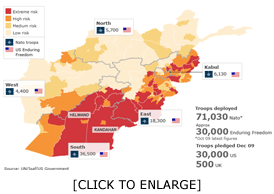- About us
- ABOUT MP-IDSA
- VISION STATEMENT
- CONFERENCE FACILITY
- EXECUTIVE COUNCIL
- Memorandum of Association: Rules and Regulations
- MP-IDSA NEWS
- DIRECTOR GENERAL
- INTERNATIONAL INTERACTIONS
- Fellowship rules
- VISITING FELLOWSHIPS PROGRAMME
- K. SUBRAHMANYAM AWARD
- Deputy Director General
- INTERNSHIP PROGRAMME
- CONTACT US
- Former Presidents
- HUMAN RESOURCES
- JOBS
- Former Directors
- Prevention of Sexual Harassment
- CENTRES
- Events
- Library
- Publications
- Membership
IDSA COMMENT

An economically exhausted America is withdrawing from Afghanistan
More from the author
In his West Point speech on December 1, 2009, President Obama announced his new strategy on Afghanistan. He said he would send 30,000 additional US troops and begin the “transfer of forces” out of Afghanistan beginning July 2011. He made it clear that the United States cannot make an open-ended commitment to Afghanistan. To be sure, no timetable for withdrawal has been set. But it would appear that the dispatch of additional troops to Afghanistan is to create the conditions for a smooth retreat.
Obama also took the opportunity to outline his vision of US national security. He rejected getting involved in the reconstruction of Afghanistan since this might take a decade. The best that the United States would be prepared to do at this stage is to build capacities of the Afghan government to fight its own war.
He justified the additional deployment on the ground that it was necessary to safeguard American security from Al Qaeda, which continues to plot attacks against America and its allies. Yet, he made clear that the deployment was meant to facilitate a transition that will end with a significant lowering of American commitments.
The three core elements of the freshly announced strategy are – military (additional troops to break the ‘momentum’ of Taliban), civilian surge (to build capacities in Afghanistan but no blank cheques to the Karzai government) and a broad based partnership with Pakistan (helping it to fight the extremist elements). Obama has also clearly stated that the United States will try to draw out those sections of the Taliban who believe in human rights. Thus changes in the political dispensation in Afghanistan cannot be ruled out. This should worry the current government in Kabul as it has been asking for a long term commitment from the West and which is unlikely to happen.
Obama’s strategy falls short on many counts. There is simply not enough time to build the capacities of Afghan forces to the point where they can take on the Taliban. Reaching out to the Taliban will only hasten the demise of the Karzai regime. The Taliban have got a signal that the United States is going to withdraw. They will wait out the deployment and the subsequent withdrawal of American troops. Pakistanis, who have been critical of the United States, will now once again feel that America is withdrawing from the region and leaving behind a huge mess. Their resolve to fight the extremists will weaken.
It is necessary to understand why the United States is withdrawing from a war which it considers of utmost importance for its own security. Obama gave enough hints of that in his speech. After first justifying that additional troop deployment was essential for America’s security, Obama spent considerable time explaining why the United States cannot remain engaged in Afghanistan militarily for too long. The reasons are economic. Obama referred to the trillion plus dollars cost incurred in fighting the two wars in Iraq and Afghanistan. The additional deployment of thirty thousand troops will cost the US taxpayer $30 billion, which is more than the entire annual defence budget of India! Obama also referred to the fact that the United States had suffered greatly in the recent global economic crisis. The need to rebuild America’s economy was urgent. He also pointed to the need to strike a balance between different national programmes that the United States is pursuing. In a passage, Obama noted:
Most leaders would shy away from pointing out explicitly the economic costs of national security. Obama did just that and deserves credit for establishing the link in a clear, forthright and honest manner.
Obama took the opportunity at West Point to outline his vision of US national security. He said that the United States cannot secure itself through military means alone. Building homeland security was important as it was impossible for the United States to apprehend every terrorist. Likewise, the United States needs to explore effective alliances and partnerships and take recourse to diplomacy to secure itself. He talked of Afghanistan, terrorism, nuclear terrorism and the need to work towards a world without nuclear weapons in the same breath.
It remains to be seen whether the US Congress will give the additional $30 billion required for the deployment. Domestic support for the war in the United States is waning and Obama’s own popularity is falling.
Wars in Iraq and Afghanistan have made the US president reappraise his country’s security and foreign polices. The United States is facing serious economic problems, and Obama seems to have drawn the lesson that national security is not just about military strength but that it is equally about the economy, partnerships and diplomacy.
All countries in South Asia should be prepared for the eventual US withdrawal. There is an increasing likelihood that the Taliban would return to power in some form or the other with or without US help. The region faces greater prospects of instability if the Taliban return to power. Pakistan will be affected but so will be India. There is need for the international community to ensure that the US withdrawal from Afghanistan is orderly. Regional initiatives must be thought through. A new chapter in the history of Afghanistan and the region may be beginning.
Related Publications